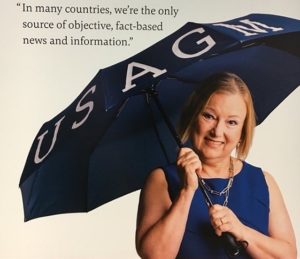BBG – USAGM Watch Commentary EXCLUSIVE
A just released study by the American Foreign Policy Council (AFPC) concludes that the track record of Iran media reform at the U.S. Agency for Global Media (USAGM), previously known as the Broadcasting Board of Governors (BBG) is “mixed – at least so far” and “a number of necessary changes remain unimplemented or unexplored.” A study undertaken by the American Foreign Policy Council delivered in the Fall of 2017, and formally published by the BBG, showed that the federal agency under its current management “on the whole, perpetuated to audiences the appearance of pro-regime propaganda, rather than objective reporting, on the part of both the VOA and Farda.”

VOA refers to the Voice of America Persian Service. Radio Farda is the Iranian program of Radio Free Europe / Radio Liberty (RFE/RL). Both VOA and RFE/RL are managed by USAGM and funded by U.S. taxpayers.
In a new, just-released assessment by AFPC Senior Vice President Ilan I. Berman, AFPC said that “The USAGM’s new broadcast to Iran, VOA 365, “does…incorporate a number of noteworthy programmatic and operational modifications to official Persian-language broadcasting on the part of the U.S. government,” but the new AFPC report adds that “there is a clear temptation on the part of agency management to view the changes it has made as the culmination of a reform effort – rather than as part of a dynamic, ongoing process.” AFPC calls it “deeply detrimental.”
AFPC concluded that “Even with the reforms carried out to date, the USAGM’s Persian-language outreach remains far too opaque and unaccountable.”
AFPC’s latest study also focuses on doubts about USAGM’s Iran audience claims:
Accurately Gauging Effectiveness. At the core of policy discussions about the future of U.S. broadcasting toward the Islamic Republic is the question of impact. According to the USAGM, American outlets collectively occupy an influential position in the Iranian media space. The agency has asserted that its programming commands an audience of roughly one-quarter of all adult Iranians every week.[13 See, for example, U.S. Agency for Global Media, “FACT SHEET: Iran,” September 2018, https://www.usagm.gov/wp-content/uploads/2018/09/Iran-fact-sheet.pdf.] Critics, however, have called this claim into question, and suggested that the USAGM boasts a far more modest share of the Iranian media market – one that is eclipsed by both BBC Persian and Manoto.[14 See, for example, Kim Andrew Elliott, “Twitter Poll: VOA and Radio Farda USAGM Audience Claims are False,” BBG-USAGM Watch, March 27, 2019, https://bbgwatch.com/twitter-poll-voa-and-radio-farda-usagm-iran-audience-claims-are-false/] The true level of popularity of U.S. broadcasting is of profound importance to American policymakers, insofar as it will determine whether allocating additional resources to further optimize and expand outreach is warranted. To inform this judgement, however, it will be necessary for responsible agencies to commission a credible, thorough third-party assessment of the reach and impact of U.S. messaging to the Iranian public.
READ MORE: Iran Strategy Brief No. 13: Reforming U.S. Persian Language Media – A Preliminary Assessment, Ilan I. Berman, AFPC, April 22, 2019.
ALSO SEE: RFE/RL achieves a pro-Iran regime ‘Hate America’ impact. By Ted Lipien. BBG – USAGM Watch, April 9, 2019.
ALSO SEE: VOICE OF AMERICA NEWS, “Iran Labels US as Real Leader of World Terrorism,” VOA News, April 9, 2019.
ALSO READ: “Iran Condemns IRGC Blacklisting, Accuses U.S. Of ‘Global Terrorism’,” Radio Free Europe / Radio Liberty (RFE/RL), April 9, 2019.
Photo: USAGM CEO John F. Lansing. He joined USAGM (then known as BBG) as CEO and Director in September 2015.
In his appearance on March 27, 2019 before the House Appropriations Committee’s Subcommittee on State, Foreign Operations and Related Programs to discuss the Department of State Budget Request for FY 2020, Secretary of State Michael Pompeo has called for leadership change at the U.S. Agency for Global Media.
“And I would urge to get a CEO of that organization in place so that the BBG will have the right leadership so they can do the traditional mission – perhaps in a different information environment than we did back in the Cold War, but can perform its function in a way that is important and noble, and reflects the enormous resources that are – that American taxpayers have put towards that,” Secretary Pompeo told members of Congress.
“I’m very concerned about it,” Secretary Pompeo added.
ALSO SEE:
“Additionally, in the aggregate, reportage on bilateral relations between the U.S. government and the Iranian regime conveyed an impression of equivalence between the parties, a position that is both surprising and improper for broadcasting that is funded by the U.S. government. It is also deeply misleading, insofar as it conflates the Iranian regime with the Iranian people, whereas the U.S. government opposes the former while supporting the latter.”
AFCP
AMERICAN FOREIGN POLICY COUNCIL U.S. PERSIAN MEDIA STUDY
October 6, 2017

